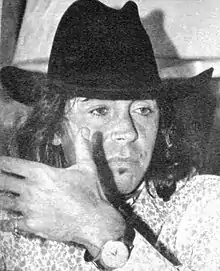Gato Barbieri
Leandro "Gato" Barbieri (28 November 1932 – 2 April 2016) was an Argentine jazz tenor saxophonist who rose to fame during the free jazz movement in the 1960s and is known for his Latin jazz recordings of the 1970s.[1] His nickname, Gato, is Spanish for "cat".
Gato Barbieri | |
|---|---|
 Barbieri in 1970 | |
| Background information | |
| Birth name | Leandro Barbieri |
| Born | 28 November 1932 Rosario, Santa Fe, Argentina |
| Died | 2 April 2016 (aged 83) New York City |
| Genres | Jazz, avant-garde jazz, free jazz, Latin jazz, smooth jazz |
| Occupation(s) | Musician, bandleader |
| Instruments | Tenor saxophone |
| Years active | 1961–2016 |
| Labels | Impulse!, A&M, Flying Dutchman, United Artists, ESP-Disk, Durium, Columbia |
Biography
Born to a family of musicians, Barbieri began playing music after hearing Charlie Parker's "Now's the Time". He played the clarinet and later the alto saxophone while performing with the Argentinean pianist Lalo Schifrin in the late 1950s. By the early 1960s, while playing in Rome, he also worked with the trumpeter Don Cherry. By now influenced by John Coltrane's late recordings, as well as those from other free jazz saxophonists such as Albert Ayler and Pharoah Sanders, he began to develop the warm and gritty tone with which he is associated. In the late 1960s, he was fusing music from South America into his playing and contributed to multi-artist projects like Charlie Haden's Liberation Music Orchestra and Carla Bley's Escalator Over The Hill. His score for Bernardo Bertolucci's 1972 film Last Tango in Paris earned him a Grammy Award and led to a record deal with Impulse! Records.[1]
By the mid-1970s, he was recording for A&M Records and moved his music towards soul-jazz and jazz-pop. Caliente! (1976) included his best known song, a rendition of Carlos Santana's "Europa". That and the follow-up album, Ruby Ruby (1977) were both produced by fellow musician and label co-founder, Herb Alpert.
Although he continued to record and perform well into the 1980s, including composing the scores to films such as Firepower (1979) and Strangers Kiss (1983), the death of his wife Michelle led him to withdraw from the public arena. He returned to recording and performing in the late 1990s, composing original scores at the behest of friend Bahman Maghsoudlou for Amir Naderi's Manhattan by Numbers (1991) and Daryush Shokof's Seven Servants (1996). The album Qué Pasa (1997) moved more into the style of smooth jazz.
Barbieri was the inspiration for the character Zoot in the fictional Muppet band Dr. Teeth and The Electric Mayhem.[2]
On April 2, 2016, Barbieri died of pneumonia in New York City at the age of 83.[3]
On 25 June 2019, The New York Times Magazine listed Gato Barbieri among hundreds of artists whose material was reportedly destroyed in the 2008 Universal fire.[4]
Discography
As leader
- In Search of the Mystery (ESP Disk, 1967)
- Obsession (Affinity, 1967, [1978])
- Confluence (Freedom, 1968) with Dollar Brand – also released as Hamba Khale! (1974) and I Grandi del Jazz (1976)
- The Third World (Flying Dutchman, 1969)
- Fenix (Flying Dutchman, 1971)
- El Pampero (Flying Dutchman, 1971)
- Under Fire (Flying Dutchman, 1971 [1973])
- Last Tango in Paris (United Artists, 1972)
- Bolivia (Flying Dutchman, 1973)
- Chapter One: Latin America (Impulse!, 1973)
- Chapter Two: Hasta Siempre (Impulse!, 1973)
- Chapter Three: Viva Emiliano Zapata (Impulse!, 1974)
- Yesterdays (Flying Dutchman, 1974)
- Chapter Four: Alive in New York (Impulse!, 1975)
- El Gato (1975 compilation) includes 1 previously unreleased track
- Caliente! (A&M, 1976)
- I Grandi del Jazz (1976) (Previously released as Confluence and Hamba Khale!)
- Ruby Ruby (1977)
- Tropico (1978)
- Euphoria (1979)
- Bahia (1982)
- Apasionado (1983)
- Para Los Amigos (1984)
- Passion And Fire (1988)
- The Third World Revisited (1988 compilation)
- Qué Pasa (1997)
- Che Corazón (1999)
- The Shadow of The Cat (2002)
- New York Meeting (2010)
As sideman
With Carla Bley and Paul Haines
- Escalator Over The Hill (JCOA, 1971)
- Tropic Appetites (Watt, 1974)
With Gary Burton
- A Genuine Tong Funeral (RCA, 1967)
With Don Cherry
- Togetherness (Durium, 1965)
- Complete Communion (Blue Note, 1966)
- Live at Jazzhus Montmartre 1966 (1966)
- Symphony for Improvisers (Blue Note, 1966)
With Charlie Haden
- Liberation Music Orchestra (Impulse!, 1969)
With the Jazz Composer's Orchestra
With Oliver Nelson
- Swiss Suite (Flying Dutchman, 1971)
With Alan Shorter
- Orgasm (Verve, 1968)
With Antonello Venditti
- Da Sansiro A Samarcanda'
References
- Ginell, Richard S. "Gato Barbieri Biography". AllMusic. All Media Network. Retrieved April 18, 2016.
- Gupta, Anika (October 2008). "The Woman Behind Miss Piggy". Smithsonian. ISSN 0037-7333.
- Keepnews, Peter (April 2, 2016). "Gato Barbieri, Latin Jazz Trailblazer With a Saxophone, Is Dead at 83". The New York Times. p. A20.
- Rosen, Jody (June 25, 2019). "Here Are Hundreds More Artists Whose Tapes Were Destroyed in the UMG Fire". The New York Times. Retrieved June 28, 2019.
External links
- Gato Barbieri discography at Discogs
- Gato Barbieri at IMDb
- Gato Barbieri at Find a Grave